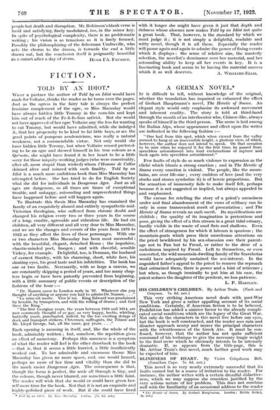A GERMAN NOVEL.*
IT is difficult to tell, without knowledge of the original, whether the translation has impaired or enhanced the effect of Gerhart Hauptmann's novel, The Heretic of Soana. An elegant style would only emphasise its awkward movement and inherent crudity. The story is told at third-hand through the mouth of an interlocutor who, Chinese-like, always speaks of himself in the third person. The scene is laid among the Italian Alps, whose appearance and effect upon the writer are indicated in the following fashion :— " One had from this spot, which when viewed from the valley seemed to hang at an inaccessible height, a glorious view, of which, however, the author does not intend to speak. On that occasion to be sure when he enjoyed it for the first time, he passed from speechless astonishment into loud exclamations of rapture and back again into speechless astonishment."
Few faults of style do so much violence to expression as the cliché which blunts a strong emotion ; and in The Heretic of Soana every emotion is violent. The people, like the moun- tains, are over life-size ; every emblem of love (and the very stocks and stones symbolize it) is of heroic proportions. But the sensation of immensity fails to make itself felt, perhaps
because it is not suggested or implied, but always appealed to and emphasised.
The excuse for retelling the story of a priest's uneasiness under and final abandonment of the vows of celibacy can lie only in some transcendent merit of presentation ; and The Heretic of Soana reveals no such merit. Its mystific,ations are childish ; the quality of its imagination is pretentious and poor, giving the effect of a thin stream in a great tidal estuary, hardly visible in the waste of mud flats and shallows. Even the effect of strangeness for which it labours is spurious ; the mountain-goats which press their unwelcome attentions on the priest bewildered by his sex-obsession owe their parent- age not to Pan but to Freud, or rather to the decor of a melodrama inspired by Freud. Left to themselves, or even converted, the wild mountain-dwelling family of the Scarabotas would have adequately sustained the sex-interest. In the anguished father's appeal to the priest to remove the reproach that ostracized them, there is power and a hint of reticence ; but when, as though ironically to put him at his ease, the priest seduces the daughter of the penitent, we lose patience.
L. P. HARTLEY.


























































 Previous page
Previous page